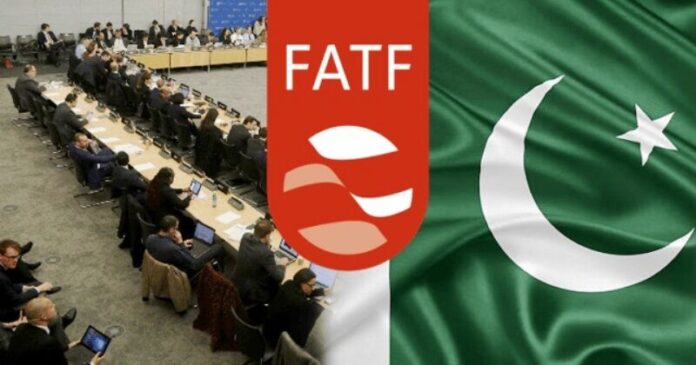PARIS: Pakistan will remain on the Financial Action Task Force (FATF) grey list for another four months.
According to a handout issued by the Ministry of Finance, the FATF has appreciated Pakistan for the significant progress made on the entire action plan.
The plenary meetings of FATF were held virtually from February 22-25, 2021, where its members discussed a range of topics relating to Pakistan’s progress. Pakistan’s delegation in the FATF Plenary was led by Chairman FATF Coordination Committee and Federal Minister for Industries and Production Muhammad Hammad Azhar, and attended by senior officers from the Ministry of Foreign Affairs, National Counter Terrorism Authority
(NACTA), Financial Monitoring Unit (FMU), National FATF secretariat and other key stakeholders.
In its plenary meeting held on February 25, FATF has stated: “To date, Pakistan has made progress across all action plan items and has now largely addressed 24 of the 27 action items.”
The global watchdog has also acknowledged the continued high-level political commitment of Pakistan to combat terrorist financing which, according to the FATF statement, has led to significant progress across comprehensive countering financing of terrorism plan.
Pakistan has undertaken enormous work to strengthen its anti-money laundering (AML) and combatting finance of terrorism (CFT) regime and address the strategic counter-terrorist financing-related deficiencies.
In addition to the acknowledgement by FATF in its plenary statement that Pakistan has made significant progress on the entire action plan by addressing 24 out of the 27 items in the action plan. Pakistan has also made notable progress in the remaining 3 action items which also stand partially addressed. As of now, all the 10 action items pertaining to the financial sector and border controls have been addressed.
In relation to Terrorism Financing (TF) investigations and prosecutions, 6 of the 8 action items have been addressed, whereas, for targeted financial sanctions, 8 of the 9 action items also stand addressed. The progress on the remaining 3 action items is well underway with significant progress made so far.
The Ministry of Finance reaffirms its commitment to continue strengthening the AML/CFT regime in line with global standards.
In its previous meeting in December, the body said Islamabad had now reached 21 targets out of 27 set for it in 2018 — when Pakistan was placed on the list of countries with inadequate controls over money laundering — and urged it to complete the plan by February.
Starting February 21, the global dirty money watchdog engaged in a four-day virtual meeting to discuss, among other matters, the status of Pakistan after a review of the measures it has taken to combat the menace of ill-gotten money.
The meetings were hosted in Paris and multiple countries, including Pakistan, will come under review.
Officials familiar with the developments had – prior to the statement – expressed strong confidence that Pakistan would finally be removed from the list “if the decisions are taken on merit”.
Despite active Indian lobbying, few analysts expected Pakistan to be blacklisted, which so far includes only Iran and North Korea. A minimum of three votes by FATF members are required to avoid the blacklist and Pakistan enjoys the unwavering support of Malaysia, Turkey, and its all-weather friend China.
While it has strong allies among the 37-member countries that make up FATF, Russian and US support was critical to being removed from the grey list.
The government has lately been pushing through tougher legislation and other measures to ward off blacklisting by the watchdog which means it would be shunned by international financial institutions.
Last year, the government got three laws — the Anti-Money Laundering (second amendment) Bill-2020, Anti-Terrorism Act (ATA) (third amendment) Bill-2020, and Islamabad Capital Territory Waqf Properties Bill-2020 — passed in a joint sitting of Parliament.
In recent months, law enforcement agencies have cracked down on hardline religious groups — especially Lashkar-e-Taiba (LeT) and its welfare arms, Jamaatud Dawa (JuD) and Falah-e-Insanyat — and on their sources of income, arresting, trying, and convicting several of their members and leaders.
Pakistan had already complied with the six recommendations and also submitted details to the FATF Secretariat, reports suggest. The progress would come under evaluation during the upcoming meetings.





Great Post
excellent Work.
Its 4:30 Paris Time Not Pakistan time
The FATF decision shows that Pakistan has failed to check terrorist activities in its territory. The FATF has given Pakistan a lot of time but Pakistan has still not stopped supporting the terrorists. Terrorists in India and Afghanistan continue to receive support from Pakistan and this poses a threat to regional peace and stability. Therefore the FATF should have taken tough measures against Pakistan. Pakistan has been continuously involved in terrorist incidents to fulfill its strategic interests.
It’s all due to the geo political landscape. The only solution lies in the fact that Pakistan should be economically strong enough to not only withstand these head winds, but also get out from the debt traps that the international donors are pouring in.